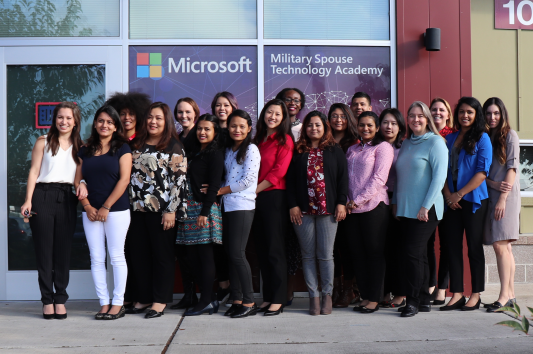Microsoft continues its commitment to military community with launch of the Military Spouse Technology Academy
EDITORIAL UPDATE: (February 2021) The Microsoft Military Affairs team is committed to the military spouse community; however, at this time we have decided to discontinue the Military Spouse Technology Academy (MSTA). We will continue to look for and evaluate additional programs to support the military spouse community going forward (or in the future). Please continue to visit our military.microsoft.com website for any future military spouse community updates.
Spouses of active military service members face unique challenges. Frequent moves often pull them away from existing support networks, forcing families to build new relationships every few years. Relocations also require a constant job search while simultaneously finding new schools and childcare. This can be especially difficult when new assignments send families to areas with poor employment opportunities and when deployments necessitate extended periods of separation from loved ones. As a result, spouses face a 16 percent unemployment rate, which was four times the national rate for adults over 20 in the year 2017.

Today, Microsoft Military Affairs is expanding its commitment to this community with the launch of a new pilot program uniquely designed to train military spouses with necessary skills for long-lasting and meaningful technology careers that are both high-paying and portable.
Providing programs and support tailored to military spouses is a critical component of giving back to our broader military community. Through the Military Spouse Technology Academy (MSTA) pilot program, Microsoft seeks to deepen its commitment to military spouses by working with nonprofits and business leaders to not only help this community build the skills necessary to succeed in the technology sector, but also to enable military spouses to continue their career progression in the face of frequent moves. The program was specifically constructed to take these needs into account, offering an avenue to skilled jobs that can often be performed remotely.
“The success of Microsoft Software & Systems Academy is evidence that our programs for the military community work,” said U.S. Marine Corps Major General (Ret.) Chris Cortez, vice president of Microsoft Military Affairs. “Now we’re eager to apply what we’ve learned to a new, groundbreaking program called Military Spouse Technology Academy. This pilot program is one of a kind and furthers our commitment to service members and their families.”

MSTA will provide soft-skills training, technology training and mentorship. The 22-week classroom-based program will empower spouses to seek careers in Server and Cloud Administration, working jointly with USO’s Pathfinder program, which supports military members and spouses during their transition with services, opportunities and resources.
Nineteen military spouses will participate in the pilot, which will take place Sept. 26 to Feb. 28 at a USO classroom space just outside Joint Base Lewis-McChord in Lakewood, Washington. The schedule is optimized for spouses, who often are primary caregivers to their children. The USO will provide wrap-around assistance, helping cohort members complete MSTA and seek purposeful employment.
MSTA enjoys broad support across Washington state at the highest levels. “It’s incredibly important that we help promote opportunities for the families and spouses of the men and women who serve in our military. I am proud that Washington has the first statewide effort to establish a military spouse employment empowerment zone. We have great partnerships in place with installations from all branches of military service and commitments from a wide range of employers who are ready to leverage the workforce talents of this important community,” Gov. Jay Inslee said. “I am pleased that Microsoft is expanding their commitment to families of service members and look forward to future efforts to support our nation’s military spouses.”
Gina Kirby, an MSTA mentor and principal specialist for Azure sales at Microsoft, is a military spouse. “I am proud to see Microsoft commit time, resources and energy to a key participant in our military community: spouses,” she said. “The sacrifices of a military spouse are unique and challenging. I have seen firsthand the abilities these individuals have, the obstacles they overcome, and the impact they have on the group at large.”

Today, Microsoft Military Affairs will hold a ribbon-cutting ceremony to celebrate the launch of the MSTA pilot program. J.D. Crouch II, CEO and president of the USO; Senator Steve Hobbs, 44th District; Joint Base Lewis-McChord Commander Sergeant Major Kenny Clayborn; and Elizabeth O’Brien, senior director, Military Spouse Program, Hiring Our Heroes will also be present to support and celebrate this achievement.
“Military spouses are extremely strong, resilient and innovative — and the value and benefits to building up this community are tremendous,” said USO Vice President of Programs Jeremy Albritton. “When we support our military spouses, we also strengthen our service members and military families. The USO is thrilled that companies like Microsoft are making a dedicated effort to help educate and empower military spouses, particularly within the field of technology.”
MSTA reflects the success of Microsoft Software & Systems Academy (MSSA), which launched in 2013 to provide veterans and transitioning service members with critical technology skills for the digital economy. Since its inception, Microsoft has seen a retention rate of over 90 percent of MSSA graduates after the second year and beyond — compared with most transitioning military members and veterans who stay in their first job less than two years. In March 2018, Microsoft completed Phase One of its 2015 stated goal to open 14 MSSA locations coast-to-coast with the capacity to graduate 1,000 students yearly.
Microsoft is proud of this groundbreaking new pilot program as part of its journey to continue learning how best to serve military spouses. It’s a small part of the company’s broader commitment to members of the armed forces through MSSA, YouthSpark and more.
